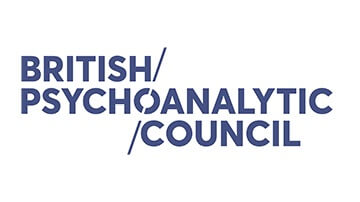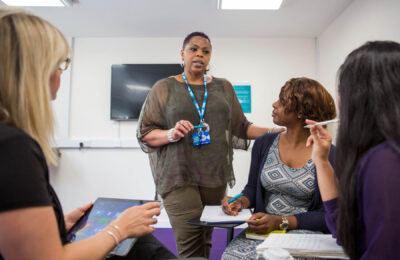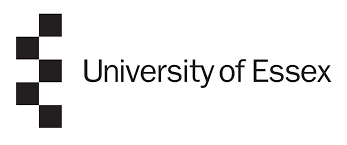
Psychodynamic Psychotherapy (M58L, Leeds)
Discover our consolidated Master’s degree and clinical training in psychodynamic psychotherapy
This four-year, part-time course will equip you with the knowledge, skills and experience needed to practise as a psychodynamic or forensic psychotherapist in a wide range of settings.
You may choose to graduate after three years (and successful completion of the dissertation) with a Master’s degree, or complete the full four years of training and also be eligible to practise as a psychodynamic or forensic psychotherapist.
This course will be validated by the University of Essex, and accredited by the British Psychoanalytic Council (BPC).
The course is also available to study in London as a daytime (M58) or a blended version (BM58). Only the London daytime version of the course is eligible for a Student visa.
About this course
This innovative course will support you in developing the theoretical understanding and clinical experience needed to practise effectively as a psychodynamic or forensic psychotherapist
In the first three years of the training, you will work towards a Master’s degree, subject to validation by the University of Essex. Upon completion of the MA, you will have the opportunity to continue onto a further year of clinical training, subject to accreditation by the British Psychoanalytic Council (BPC).
Lectures covering key psychoanalytic concepts will be delivered throughout the first two years of the course – first examining Freudian theory and the historical context of psychoanalysis, before moving onto the works of Melanie Klein, Donald Winnicott and Wilfred Bion. In the third and fourth years, you will be offered a range of supplementary lectures, covering advanced concepts and featuring guest speakers, to support your work towards clinical qualification. Understanding of psychoanalytic theory will be further supported through interactive theory seminars throughout all four years of the course. Reading materials will be thoughtfully selected to address a broad spectrum of perspectives, ideas and interpretations – promoting a holistic grasp of the subject matter. Experiential groups will run throughout the first two years of the training, allowing you to develop your understanding of unconscious processes and group dynamics.
You will undertake regular clinical placements throughout the course, usually for half a day per week – gaining real-world experience in a variety of settings, including the NHS. In the first year, interactive workshops will prepare you for clinical practice, while clinical seminars and case study seminars support ongoing learning and reflection throughout the course. The third-year dissertation offers the opportunity to engage in an original research project with a clinical focus.
You are required to undertake weekly therapy with a BPC-registered psychoanalytic psychotherapist or psychoanalyst (not a psychodynamic psychotherapist) for the duration of the course. There is also a requirement to be supervised by a BPC-registered psychoanalytic psychotherapist or psychoanalyst at various points in the training, and to participate in clinical supervision groups – all ensuring a well-rounded education in psychoanalytic practice.
Modules
Module 1: Psychoanalytic Theory 1
- Year one
- FHEQ level 7
- 20 credits
- Core module
- Module lead: Rodrigo Sanchez
Module aims
The aims of the module are to:
- critically evaluate psychoanalytic concepts which support the clinical work
- understand the role of intercultural aspects in contemporary psychotherapy and start to consider a forensic perspective
- gain understanding of the basic psychoanalytic techniques
- gain systematic understanding of the differences in key psychoanalytic concepts
- facilitate critical reading of key psychoanalytic texts
- consider the theoretical material presented in the light of differing cultural perspectives
- facilitate curiosity, self-reflection, and self-directed learning about reactions to the material presented
- facilitate advanced critical discussion of the ideas presented
- provide opportunities for students to consider and critically appraise the wider clinical context which incorporates other theoretical perspectives and treatment modalities
- provide the basic concept to facilitate a psychodynamic psychotherapy
Module assessment
You must submit two essays of 2,500 words each.
Module 2: Lectures and Workshops 1
- Year one
- FHEQ level 7
- 20 credits
- Core module
- Module lead: Rodrigo Sanchez
Module aims
The aims of the module are to:
- extend the practical understanding of the setting and of the therapeutic process
- systematically understand the uniqueness of psychodynamic psychotherapy and its history
- learn how to apply psychoanalytic ideas to a hypothetical scenario through roleplaying
- demonstrate systematic conceptual understanding of the early months of psychotherapy treatment
- reflect on the impact of your interventions with patients in complex clinical situations where there are a number of unknown variables
- tolerate uncertainty, discomfort and disturbance when seeing a patient
- systematically link the clinical material with theoretical ideas
- autonomously identify core psychoanalytic concepts as they become manifest in psychotherapy
- begin to develop an understanding of psychopathology and how this is understood in psychoanalytic terms
- critically consider the specific role of cultural and other issues of diversity (such as sexuality, gender, class) in the case presented
- progressively understand the development of Freudian theory
- extend your understanding on Freud’s work its relevance in today’s practice
- understand the early history of psychoanalysis and its influences
Module assessment
You must take an online, multiple-choice quiz, made up of 20 questions. The quiz is a pass/fail exercise that can only be taken on two occasions. You must achieve 80% correct answers in order to pass.
Module 3: Clinical Seminar 1
- Year one
- FHEQ level 7
- 20 credits
- Core module
- Module lead: Rodrigo Sanchez
Module aims
The aims of the module are to:
- extend the application of clinical skills taught in the supervision group
- systematically understand the impact of patients’ history in the present
- apply the idea of clinical formulation with reference to evidential clinical data to support suggested hypothesis
- demonstrate systematic conceptual understanding of the early months of psychotherapy treatment
- reflect on the impact of your interventions with patients in complex clinical situations where there are a number of unknown variables
- tolerate uncertainty, discomfort and disturbance when seeing a patient
- systematically link the clinical material with theoretical ideas
- autonomously identify core psychoanalytic concepts as they become manifest in psychotherapy
- begin to develop an understanding of psychopathology and how this is understood in psychoanalytic terms
- critically consider the specific role of cultural and other issues of diversity (such as sexuality, gender, class) in the case presented
- demonstrate initiative and responsibility in participating in group discussion in a reflective, respectful way
Module assessment
You must submit a 5,000-word clinical portfolio, and clinical supervision report. You must also achieve at least 80% attendance at experiential groups and seminars.
Module 4: Psychoanalytic Theory
- Year two
- FHEQ level 7
- 20 credits
- Core module
- Module lead: Rodrigo Sanchez
Module aims
The aims of the module are to:
- critically evaluate psychoanalytic concepts which support the clinical work
- understand the role of intercultural aspects in contemporary psychotherapy and forensic psychotherapy
- gain further understanding of psychoanalytic techniques
- gain systematic understanding of the differences in key psychoanalytic concepts.
- facilitate critical reading of key psychoanalytic texts
- consider the theoretical material presented in the light of differing cultural perspectives
- facilitate curiosity, self-reflection, and self-directed learning about reactions to the material presented
- facilitate advanced critical discussion of the ideas presented
- provide opportunities for students to consider and critically appraise the wider clinical context which incorporates other theoretical perspectives and treatment modalities
- provide the basic concepts to facilitate a psychodynamic psychotherapy
- explain the student understanding on sexuality
Module assessment
You must submit a 5,000 word essay.
Module 5: Theory Lectures
- Year two
- FHEQ level 7
- 20 credits
- Core module
- Module lead: Rodrigo Sanchez
Module aims
The aims of the module are to:
- extend the practical understanding of key concepts of Klein, Winnicott and Bion
- systematically understand the uniqueness of psychodynamic psychotherapy
- understand the role that uncertainty, discomfort and disturbance has when seeing a patient
- systematically link the clinical material with theoretical ideas of Bion, Klein and Winnicott
- autonomously identify core psychoanalytic concepts as they become manifest in psychotherapy
- begin to develop an understanding of psychopathology and how this is understood in psychoanalytic terms
- critically consider the specific role of cultural and other issues of diversity (such as sexuality, gender, class) in the case presented
- progressively understand the development of Kleinian, Winnicottian and Bionian theory
- extend the student understanding on the evolution of psychoanalytic theory
- understand the early history of psychoanalysis and its influences
Module Assessment
You must take an online, multiple-choice quiz, made up of 20 questions. The quiz is a pass/fail exercise that can only be taken on two occasions. You must achieve 80% correct answers in order to pass.
Module 6: Clinical Seminar 2
- Year two
- FHEQ level 7
- 20 credits
- Core module
- Module lead: Rodrigo Sanchez
Module aims
The aims of the module are to:
- extend the application of clinical skills taught in the supervision group
- systematically understand the impact of patients’ history in the present
- apply the idea of clinical formulation with reference to evidential clinical data to support suggested hypothesis
- demonstrate systematic conceptual understanding of the early months of psychotherapy treatment
- reflect on the impact of your interventions with patients in complex clinical situations where there are a number of unknown variables
- tolerate uncertainty, discomfort and disturbance when seeing a patient
- systematically link the clinical material with theoretical ideas
- autonomously identify core psychoanalytic concepts as they become manifest in psychotherapy
- begin to develop an understanding of psychopathology and how this is understood in psychoanalytic terms
- critically consider the specific role of cultural and other issues of diversity (such as sexuality, gender, class) in the case presented
- demonstrate initiative and responsibility in participating in group discussion in a reflective, respectful way
Module assessment
You must submit a 5,000-word clinical portfolio, and clinical supervision report. You must also achieve at least 80% attendance at experiential groups and seminars.
Module 7: Dissertation
- Year three
- FHEQ level 7
- 60 credits
- Core module
- Module lead: Paula Manners
Module aims
The aims of the module are to:
- develop critical thinking skills and research literacy. This involves teaching you how to evaluate existing research, understand research methodologies, and interpret findings
- facilitate the integration of research findings into psychotherapy practice, enabling graduates to use single case study research methodology to gain a deeper understanding of the work and to inform their clinical decision-making and treatment approaches
- contribute to the advancement of the field of psychotherapy. Through research, you can explore new ideas, test hypotheses, and generate knowledge that can lead to improvements in therapeutic techniques and outcomes
- teach students how to assess and evaluate the outcomes of psychotherapy interventions and how this is possible in psychodynamic psychotherapy
- instil an understanding of ethical considerations in psychotherapy research. You should be aware of ethical guidelines and the importance of conducting research in a responsible and sensitive manner, particularly when it involves human subjects
- provide you with practical research skills, including how to design and conduct research studies, gather and analyse data, and communicate research findings effectively
- encourage you to contribute to the evidence base in psychotherapy and to expand your understanding of how this is possible in psychodynamic psychotherapy
- foster a culture of lifelong learning in which practitioners continue to engage with and learn from research throughout your careers
Module assessment
You must first submit a 2,500 word proposal, laying out the main themes and research question that you plan to address in your full dissertation. Then, you must submit a 9,000 word dissertation, investigating a chosen psychoanalytic concept, for which you will formulate a research question.
Who is this course for?
This training is for mental health professionals working across a wide range of sectors – you might be a psychiatrist, psychologist, social worker or nurse, or be in another mental health role in the NHS, voluntary or private sector.
The training is also suitable for those who do not have a clinical background in mental health, but who have completed some psychoanalytically informed introductory training and a psychiatric placement prior to applying.
Course details
To be eligible, you must:
- have a good honours degree, or have completed our Introduction to Counselling and Psychotherapy (D12/ED12) course;
- hold a professional qualification in mental health or have at least six months direct experience of working, volunteering or shadowing in a psychiatric setting;
- are established in therapy with a BPC-registered psychoanalytic psychotherapist or psychoanalyst (not a psychodynamic psychotherapist) prior to starting the course, or ideally by the time you apply. Therapy should take place at least once per week, though twice weekly is strongly recommended. Please note that you cannot start your clinical work with a patient until you are settled in your personal therapy for at least six months. If you need help finding a suitable therapist in your area, please contact us.
Personal suitability for the work is also an important factor that will be assessed at interview.
If you are considering transferring to this course from another institution, please make this clear on your personal statement.
International students
Please note, if you require a Student visa to study in the UK, you will only be able to apply for the London daytime version of this course.
Tuition fees
Home (2026/27)
£8,270 per year (years one to three)
£5,430 (year four)
Please note that supervision is not included in the course fees for Home students, and must be arranged separately at an additional cost. Further guidance will be provided prior to the start of the academic year. In addition, you will be required to undertake personal therapy throughout the course, which you must arrange and fund independently.
International (2026/27)
£13,600 per year (years one to three)
£9,030 (year four)
Supervision is included in course fees for international students. You must also undertake personal therapy throughout the course, which you must arrange and fund independently.
Annual fee increases
Tuition fees are charged for each year of your course. If your course is longer than one year, the fees may be subject to annual inflationary increases. For more information on tuition fee changes, including paying for tuition fees, please refer to our tuition fee guidance.
Funding
Student loans
If you are studying a Master’s or Doctoral level course, you may be eligible for a postgraduate loan from the UK government. Please check our student loans guidance for eligible courses and criteria.
Funding for current students
We offer several funding options to support current students who need financial assistance during their studies. Please refer to our financial support guidance for more information.
Assessment
Regular written submissions, including essays and clinical portfolios, constitute a crucial aspect of the assessment process overseen by course staff. You will also engage in online quizzes that evaluate you knowledge of key psychoanalytic concepts, and receive supervision and progression reports. These reports play a vital role in monitoring and ensuring your steady advancement in the programme, offering a comprehensive review of your progress and the support provided.
You are also given the opportunity to engage in meaningful discussion with your tutors, fostering an environment in which you can meaningfully reflect on your academic journey. Assessment of clinical work involves feedback from dedicated supervisors and clinical seminar leaders. Your insights are pivotal in determining the your proficiency in the clinical component of the course, providing valuable guidance for successful completion. This multifaceted evaluation process ensures a holistic and supportive approach to your academic and clinical development.
To achieve the Master’s degree, you must complete and submit a 10,000-word dissertation, engaging in an original research project with a clinical focus.
All assessments are undertaken by course staff, verified by the course lead as well as other staff and then ratified by the assessment and progression board of the University of Essex.
Attendance
This course is studied on a part-time basis. It is anticipated that face-to-face teaching for M58L will take place all day on Wednesdays.
Teaching takes place at St George’s Centre, 60 Great George Street, Leeds, LS1 3DL.
You will need to set aside additional time each week for your supervision group, personal therapy sessions and placements, as well as watching pre-recorded lectures, reading course material and working on written assignments.
Supervision
You will need to set aside additional time each week for your supervision group, personal therapy sessions and placements, as well as watching pre-recorded lectures, reading course material and working on written assignments.
Graduates from this course will be eligible to practice as a psychodynamic or forensic psychotherapist, working in a wide variety of settings, including in charities, the NHS and private practice, or in forensic outpatient settings, prisons and probation services.
Application support and deadlines
If you have questions about our postgraduate courses, admissions process, or the specifics of your application, you can book a one-to-one online meeting with a member of our admissions team.
There are a number of important application deadlines associated with our postgraduate courses, however we encourage you to apply as early as possible, as spaces on our courses are limited and can be competitive.
Applications for this course are expected to close on Tuesday 30 June 2026.
Why study with us?
We are committed to providing a first-class education in contemporary psychodynamic psychotherapy. Throughout your training, you will gain insights into the latest methods and approaches that are shaping the field and develop a comprehensive understanding of psychoanalytic principles – ensuring that you are prepared for the challenges of contemporary clinical practice.
One of the advantages of studying with us is our unique blend of academic excellence and practical application. Our faculty members are actively involved in cutting-edge research, contributing to the advancement of psychoanalytic theories and methodologies. This means you will be learning from those at the forefront of the field – gaining insights that go beyond traditional textbooks.
Course facilitators
Validations and accreditations
This course will be validated by the University of Essex.

This course will be accredited by the British Psychoanalytic Council.
Apply now
Start your application for the September 2026 cohort of this course.
Please note: you may see the M58L course also referred to as PCMALM002 in communications from our application system.
Recommended courses
Explore courses to study beforehand
-
 Professional certificate
Professional certificate 
Introduction to Counselling and Psychotherapy (D12/ED12)
-
 Professional certificate
Professional certificate 
Psychodynamic Reflective Practice in Mental Health (D65)
